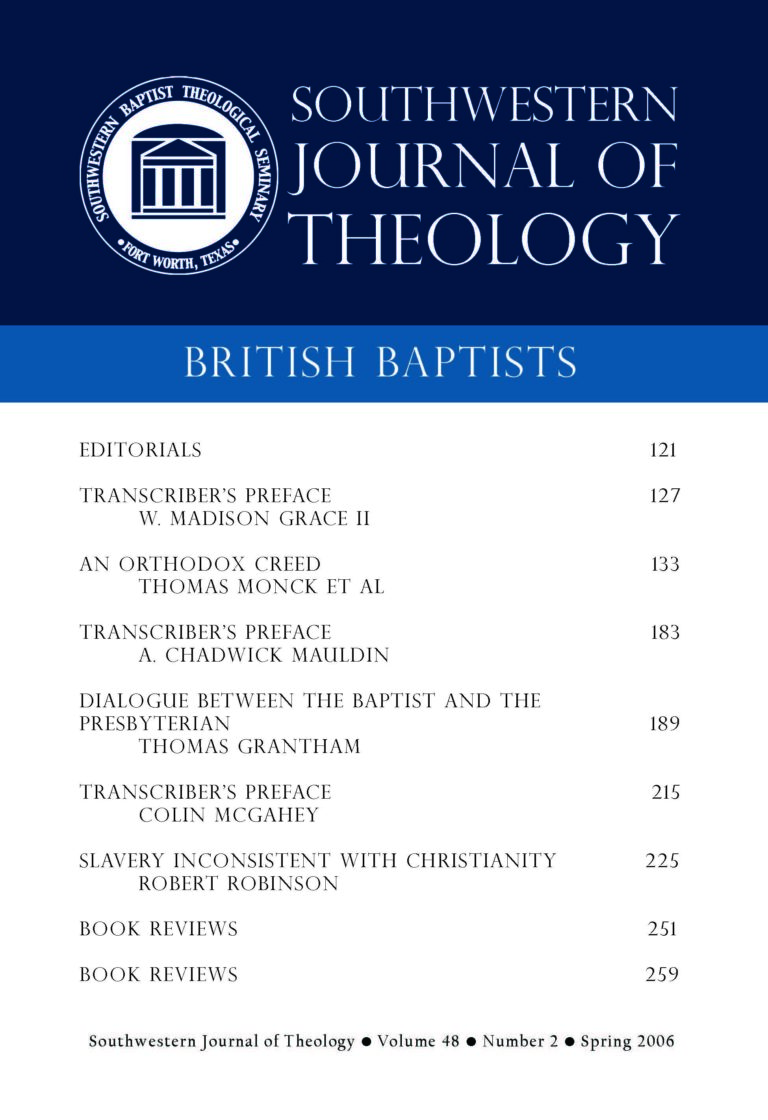
British Baptists
Southwestern Journal of Theology
Volume 48, No. 2 – Spring 2006
Managing Editor: Malcolm B. Yarnell III
By William H. Brackney. Macon, GA: Mercer University Press, 2004. 592 pages. Softcover, $40.00.
Although earlier Baptists (Underhill, McGlothlin, Lumpkin, Park- er) published volumes on the Baptist confessions of faith and others (Tull, George/Dockery) authored or co-edited volumes on selected Baptist theologians, William Brackney, at Baylor University at the time of publication and now at Acadia University, is the first author to have produced a comprehensive history of “Baptist thought.”
Building on the foundation that “Baptists do have an identifiable theological heritage” and that there has been “no dominant stream of Bap- tist theology” (p. 2), Brackney employs the term “Baptist thought” some- what ambiguously, since at times “thought” is synonymous with doctrine and at other times it also includes ethics or spirituality.
Baptist confessions of faith, including their resurgence during the twentieth century, and the theology of Baptist-composed hymnody are treated in introductory chapters that are not organically related to the remainder of the book. That remainder deals with Baptist theologians in Britain, the United States, and Canada.
In treating English Baptist and Northern (USA) Baptist theologians, the Baylor scholar divides between the pastor-theologians and the academic theologians, but in treating Southern (USA) Baptist theologians no such separation is made. Because of this division and the author’s training and experience as a church historian, the treatments of academic theologians tend to be a history of the teaching and writing in Baptist theological colleges/seminaries rather than a history of Baptist doctrine per se.
The chapter on English Baptist pastor-theologians is one of the best, although the omission of William Kiffin and the rather brief section on John Gill may be questioned. The writings of those who taught in Eng- lish Baptist theological colleges are thoroughly reviewed. Among North- ern Baptists, the detailed coverage of Brown, Newton, Madison/Colgate, Rochester, Chicago, and Crozer is coupled with silence as to Central, Northern, Eastern, and California. Likewise the treatment of Mercer, Fur- man, Southern, and Southwestern in the South is joined with the omission of Baylor, New Orleans, Golden Gate, Southeastern, and Midwestern, and of pastor-theologian Herschel Hobbs, biblical theologian Frank Stagg, and ethicists T.B. Maston and Henlee Barnette. The chapter on African- American Baptist thought presents ethics or spirituality with the single exception of Deotis Roberts. Other Baptist theologians in the USA are presented as being “in diaspora,” although W.A. Criswell had deep ties with the SBC.
The term “genetic” in the title is designed to emphasize that Baptist theology has had “genes,” defined as entities “concerned with the transmission or development of hereditary characteristics” (p. 4). Hence there is stress, more implied than specified, on transmission from pastor to members and from professor to students. In the final chapter the genes are identified as the Baptist distinctives or emphases: the Lordship of Christ, the priority of the scriptures, Christian experience, “a modified Reformed theological tradition,” regenerate church membership and congregational polity, evangelism/missions, and freedom. The entire book would seem to have demanded another gene: believer’s baptism by immersion.
Masterful in bibliography, insightful as to the relation of theology to context, and loyally sympathetic, while being analytical and critical, Brackney has made a major contribution to the understanding of the Baptists.





